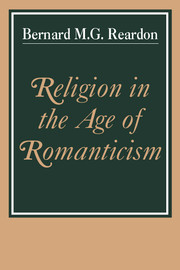Book contents
- Frontmatter
- Contents
- Preface
- 1 Romanticism, idealism and religious belief
- 2 Schleiermacher on the religious consciousness
- 3 Hegel and Christianity
- 4 The idea of God in the philosophy of Schelling
- 5 German Catholic theology in the Romantic era
- 6 Italian ontologism: Gioberti and Rosmini
- 7 Lamennais and Paroles d'un Croyant
- 8 Auguste Comte and the Religion of Humanity
- 9 Ernest Renan and the Religion of Science
- Notes
- Index
6 - Italian ontologism: Gioberti and Rosmini
Published online by Cambridge University Press: 05 June 2012
- Frontmatter
- Contents
- Preface
- 1 Romanticism, idealism and religious belief
- 2 Schleiermacher on the religious consciousness
- 3 Hegel and Christianity
- 4 The idea of God in the philosophy of Schelling
- 5 German Catholic theology in the Romantic era
- 6 Italian ontologism: Gioberti and Rosmini
- 7 Lamennais and Paroles d'un Croyant
- 8 Auguste Comte and the Religion of Humanity
- 9 Ernest Renan and the Religion of Science
- Notes
- Index
Summary
We have seen that the presiding aim of the idealist philosophy, following in this the general drift of Romantic thought, was to apprehend, whether immediately or mediately, the totality of things in their essential unity. It sought, that is, to resolve the antithesis of subject and object, of spirit and nature, and to discover the infinite in the finite, the eternal in the temporal. Any dualism of subject and object, of finite and infinite, as in Enlightenment rationalism no less than in the scholastic Aristotelian tradition of the middle ages, had finally to be overcome if the metaphysical quest were to attain its goal. From the standpoint of religious philosophy this demanded a new approach to the problem of religious knowledge, an approach which the leading Romantic thinkers saw as requiring, so to say, the externalizing of the ego, the projecting of the self into the world, either emotively, as with Schleiermacher and to some extent Fichte, or intellectively, as with Hegel. In any case the world so conceived was in some fashion to be identified with the self, subject and object being given together in experience, thus making radical scepticism impossible. In religious terms, God and the soul are correlative: one meets God in the soul, intuitively or reflectively.
- Type
- Chapter
- Information
- Religion in the Age of RomanticismStudies in Early Nineteenth-Century Thought, pp. 146 - 175Publisher: Cambridge University PressPrint publication year: 1985



